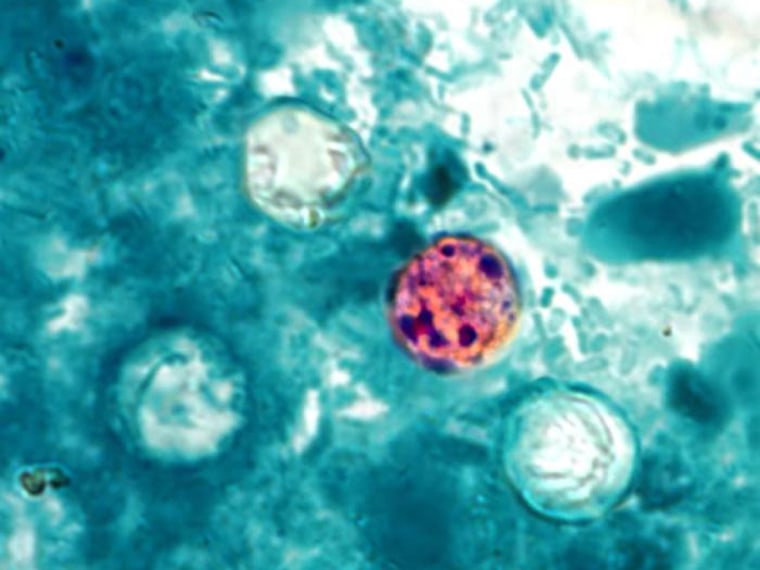More than a month after an outbreak of a nasty stomach bug that now has sickened at least 353 people in 15 states, state and federal food safety experts still have not identified the culprit behind it.
Investigators may have narrowed the hunt for the source of infections caused by cyclospora, a rare parasite that causes lingering diarrhea and other symptoms, said Dr. Patricia Quinlisk, the Iowa state medical epidemiologist.
"We got it down to five potential vegetables," Quinlisk told NBC News on Monday.
But neither she nor officials with the Centers for Disease Control and the Food and Drug Administration would say which vegetables could be part of the outbreak that has led to at least 21 hospitalizations nationwide since mid-June.
Quinlisk said she couldn’t point to a single vegetable that might be behind the outbreak first centered in Nebraska, with 77 cases, and Iowa, which now has 145 cases confirmed. David Werning, a spokesman for the state Department of Inspections and Appeals, which is handling that part of the investigation, said he wasn't aware of a list of suspect vegetables.
"DIA is not prepared at this time to identify any vegetables potentially involved in the outbreak," he said.
The source was not produced or packaged in Iowa, Werning added. Experts have not confirmed whether suspect produce was imported or grown in the U.S., though they have noted that the vegetables likely came from a single farm. It’s also not clear whether cases from all of the states are part of the same outbreak.
No food items have been implicated to date, the Centers for Disease Control and Prevention reported in an update Monday. The agency said that 353 illnesses had been reported as of Friday, but more cases have been added since then.
“At this time, CDC is investigating all leads as we receive data from affected states,” added Alan Dowell, a CDC spokesman. FDA officials reiterated that message.
But food safety experts nationwide have criticized what they say is a failure to identify a source for the outbreak much sooner.
“We should know,” said Dr. Michael Osterholm, director of the Center for Infectious Disease Research and Policy and the University of Minnesota. “We should know because we could have a second wave.”
State and federal officials should have acted more aggressively to identify the source and trace it back to its origins sooner, Osterholm said. Because cyclospora is a rare parasite, with few cases outside of outbreaks, the source should be easier to track than, say, salmonella, which is far more common.
The danger is that because the source still isn’t identified, more infections could be caused by different crops from the same producers, noted Bill Marler, a Seattle lawyer who specializes in food safety cases. The infections appeared to peak in mid-June, but there was another spike in early July before cases began waning.
“You’re already seeing a second wave,” he said.
Quinlisk defended her state’s response, saying investigators reported cases promptly and immediately began interviewing potential victims. She noted that cyclospora infections have a long incubation period of a week or more and that people often don’t seek medical attention for an ailment like diarrhea.
“I think it’s very easy to criticize when you’re not part of the outbreak investigation,” she said. “I would have liked to talk to people more quickly.”
Cyclospora infections must be reported in 39 U.S. states, plus New York City and Washington, D.C., but that means the other states aren’t required to track the bug. So far, cases have been reported in Iowa, Texas, Nebraska, Florida, Wisconsin, Illinois, New York City, Georgia, Missouri, Arkansas, Connecticut, Kansas, Minnesota, New Jersey and Ohio, according to the CDC.
Cyclospora is a parasite shed in feces and potentially spread through contaminated water and food. Symptoms include watery diarrhea that can last for weeks, loss of appetite, fatigue, vomiting, nausea.
Special laboratory tests are needed to identify the parasite, and people who are concerned they may be infected should ask their health care providers about specific identification. If people are infected, they can be successfully treated with common antibiotics, experts say.
In the meantime, experts urge consumers to use good hand hygiene and to wash their produce well, scrubbing it if possible.
JoNel Aleccia is a senior health writer with NBC News. You can reach her on Twitter at @JoNel_Aleccia or send her an email.
